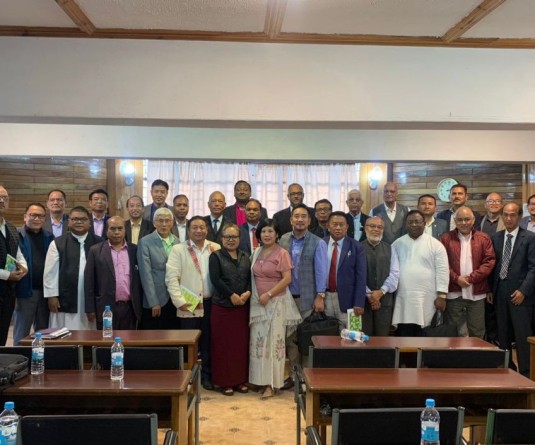
S Ela-a, Lohrü Hrüyini, Nepuni Eloziio, A Athihrü and Eloni K
The contributor of this humble article is the youths of today and is truly burdened with alcohol problems that prevail in our society. Needless to say, but alcoholism is one grave problem our youths are facing today and to combat this problem has been the pressing concern of different bodies at the local, state, national and International level. The topic on alcoholism is settled consciously as undergoing its grave impact in our day-to-day-lives. This article is an attempt to explore factors that influence in consumption of alcohol, effects of alcoholism and prohibitions to prevent alcohol intake among the students at a local context. In Manipur, the local term of alcohol is known as ‘Yu’. Traditionally it is used as a medicine, but today, the traditional medicine is diverted into abusive substances. The sale of alcohol is prohibited in Manipur since Manipur Liquor Prohibition Act (MLPA, 1991), but this prohibition is exempted in some areas (MLPA, 2002). Alcoholism is a major concern in our society for decades. Contemporarily it has become a global issue in health and social problems (WHO, 2011).
Alcoholism is an on-going debate amid two schools of thoughts in villages. On one hand, a school of thought endorsed freedom to sell alcohol. They opine that prohibition in alcohol availability increases the desire and heightens desperation to consume alcohol, thus leading to drink large quantity and result to more severe social and health problems. On the other hand, another school of thought opines that introducing Prohibition on sale of Alcohol reduces number of alcohol drinker and prevents them from becoming alcoholic. Both the views may be right according to each observations and reality tests. However, the grave concern alcoholism brought in into society is something, one has to come to consensus and work in concert to curb its problems for a peaceful and progressive society.
It was found that 50% of the college boys drink alcohol out of the total 60 boys surveyed. Out of which 16.61% are rare users, 8.4% are infrequent users, 10% are light drinkers and 15% are moderate drinkers. The findings of drinking habit of college students are disturbing. Besides, the habit of binge drinking affects their every domain in life. There are numerous reasons that influence them to indulge in alcohol. Some of the common reasons are availability of alcohol, peer pressure, social gathering, pleasure, to boost confidence, leisure time, broken relationships and cultural-based festivals. They mostly drink homemade or local brews called ‘Asaba’ which is one type of ‘yu’ commonly consume among alcohol drinkers. Alcohol is not overtly sold as it is socially unacceptable but the bootleggers business on ‘yu’ is booming ingeniously. Alcohol consumption among college students has taken a toll in their education. Their academic performance is being affected as they loss memory power; failed to do class assignments, disinterest in studies, lackadaisical attitude in college curricular activities, disorderliness in classroom. It also adversely affects their social life, family and personal relationships, spiritual life and cause severe health issues at such a young age.
Much have been done to curb alcohol problems at local and larger levels, yet, this problem continued to proliferate in our society affecting every walks of life. More so, with the increase of binge drinker among the college students, it affects their learning process which leads to devaluing of education and may impede their future. Several civil bodies, Churches, families and individuals at local level have been combating alcoholism for decades now. Mention can be made of Mao Council cognizant efforts to prevent alcohol problems in Ememei areas. They announced all Mao village authorities and other village bodies to strictly abide by its directives to fight against the menace of alcohol in Ememei areas and prevent mainly the youths from obliterating future of Ememei society. Under the guidelines of Mao Council, alcohol vendors, bootleggers, and drinkers became alarmed and their movements are now under wraps. Their network is undisclosed and becomes difficult to prevent them from operating prohibited business and hence, village authorities/bodies responsibilities are made tougher to seize the bootleggers red-handed. On one hand, the outcome of these efforts especially of women bodies has helped reduce the sight of drunk/drinking youths in villages which is highly appreciated. On the other hand, ostensibly this has not been successful in curbing alcoholism, rather, alcohol problems persist in the society and with the impact of globalization, media influences and changing lifestyles, it gives all the more reason to worry about alcohol consequences. Surely it is the wish of every individual to live in a peaceful society. Therefore, every responsible citizen should own responsibility to fight against alcoholism to save our children, our youths for our better tomorrow.
The writers are students of BA 6th Semester Sociology (Hons), Asufü Christian Institute, Punanamei, Mao




